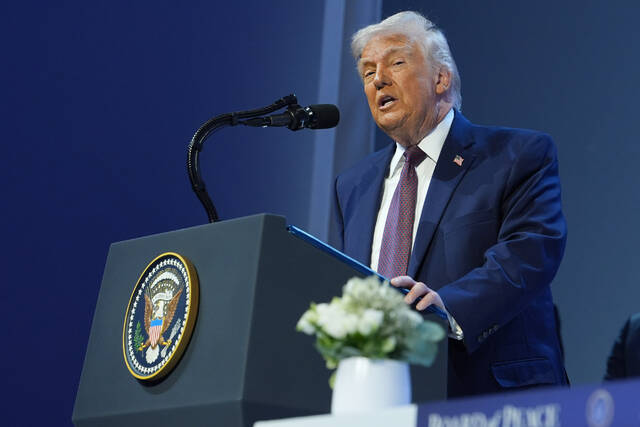Pennsylvania’s first-term U.S. Sen. Dave McCormick did a good turn for his adopted city of Pittsburgh when he hosted the energy summit at CMU last week. But if that was two steps forward in his desire to become a true Pittsburgher, he took one step back days later when he voted to defund the enormously important educational legacy of Mister Rogers and WQED public television.
The Pennsylvania Energy and Innovation Summit, a gathering of international and national leaders in technology, artificial intelligence, robotics, energy, labor and government, produced $92 billion of promised investment in Pennsylvania by some of the world’s top investors. Promises don’t always become jobs, but pledges are a start.
Hosting the summit in Pittsburgh was a coup for McCormick, a chance to show he is now a hometown guy. After struggling with carpetbagger charges during his two runs for the Senate, the former hedge fund manager may have quieted some doubters by bringing his big business crowd to Pittsburgh.
And even though a small percentage of the investment announced at the summit is destined for Pittsburgh, the chance to show off our city and its abundant resources — especially our universities, our shale deposits and our rivers — gives us hope for growth here.
Just as Pittsburgh’s leaders once anticipated the need to start moving from heavy industry into education and medicine, the establishment of the Software Engineering Institute (SEI) in Oakland in the 1980s was a first step on the long path toward last week’s summit.
U.S. Reps. Bill Coyne and Jack Murtha, two powerful Western Pennsylvania Democrats, fought hard to win the appropriations necessary to fully fund SEI. The institute became a major source of employment here by creating a whole new category of jobs, and it continues to grow.
Coyne, a member of the powerful Ways and Means Committee, lived his entire life just blocks from the SEI site. Murtha, who had been chair of the Defense Subcommittee on Appropriations, was from Johnstown. But many people called him “the other congressman from Pittsburgh” because he recognized the city as the region’s economic engine.
SEI was developed and run by CMU. It has focused on cyber security, software engineering, Defense Department technology and education for small businesses and Fortune 500 companies. Those things — and the topics on the agenda at McCormick’s summit — are the economic future of Pittsburgh, our lifeblood.
But there is another chapter of Pittsburgh’s history that also needs McCormick’s attention. In 1969, Fred Rogers appeared before Congress and famously saved public television by defending it against funding cuts proposed by President Richard Nixon. Last week, McCormick voted in favor of President Trump’s recissions bill that cut federal funding for public television.
Early Friday morning, when the House of Representatives passed the Senate bill, $1.1 billion of funding for the Corporation for Public Broadcasting was cut (along with $8 billion in foreign aid). This will force many local stations to reduce or eliminate programming.
In this town, McCormick’s Senate vote was a vote against education, against the enormous impact that public television has had in our urban and rural communities, and against Mister Rogers. We understand McCormick, a Republican, must walk a thin line with an erratic and vengeful president. But if he hopes to be seen as a real Pittsburgher, he’ll figure out a way to make this right.
Mister Rogers stood up for all of us when we were growing up. You can never be a real Pittsburgher unless you stand up for him when he needs a little help. It’s what real Pittsburghers do.








